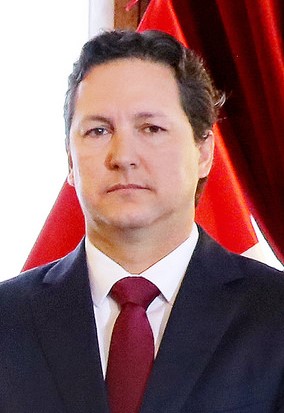Related Research Articles

Colombia, officially the Republic of Colombia, is a country primarily located in South America with insular regions in North America. The Colombian mainland is bordered by the Caribbean Sea to the north, Venezuela to the east and northeast, Brazil to the southeast, Peru and Ecuador to the south and southwest, the Pacific Ocean to the west, and Panama to the northwest. Colombia is divided into 32 departments. The Capital District of Bogotá is also the country's largest city hosting the main financial and cultural hub. Other major urban areas include Medellín, Cali, Barranquilla, Cartagena, Santa Marta, Cúcuta, Ibagué, Villavicencio and Bucaramanga. It covers an area of 1,141,748 square kilometers and has a population of around 52 million. Its rich cultural heritage—including language, religion, cuisine, and art—reflects its history as a colony, fusing cultural elements brought by immigration from Europe and the Middle East, with those brought by the African diaspora, as well as with those of the various Indigenous civilizations that predate colonization. Spanish is the official language, although Creole, English and 64 other languages are recognized regionally.

Panama, officially the Republic of Panama, is a country in Latin America at the southern end of Central America, bordering South America. It is bordered by Costa Rica to the west, Colombia to the southeast, the Caribbean Sea to the north, and the Pacific Ocean to the south. Its capital and largest city is Panama City, whose metropolitan area is home to nearly half of the country's over 4 million inhabitants.

The Colombian Liberal Party is a centre to centre-left political party in Colombia. It was founded as a classical liberal party but later developed a more social-democratic tradition, joining the Socialist International in 1999.

The Supreme Justice Tribunal is the highest court of law in the Bolivarian Republic of Venezuela and is the head of the judicial branch. As the independence of the Venezuelan judiciary under the regime of Nicolás Maduro is questioned, there have recently been many disputes as to whether this court is legitimate.

The Christian Social Party is a centre-left to centre-right political party in Ecuador.
Team Colombia was a conservative political party in Colombia. In the 2002 legislative elections, the party won, as one of the many small parties, parliamentary representation. In the 2006 legislative elections, it joined forces with the Alternative for Social Advance (ALAS), another small party, and won 7 out of 166 deputies and 5 out of 100 senators. The two political movements joined to form ALAS-Team Colombia in 2005, later becoming Somos Región Colombia.
Álvaro Araújo Castro is a Colombian economist and former actor and Senator of Colombia. A Liberal politician, leader of the ALAS-Team Colombia political movement, and founder of Alternative for Social Advance (ALAS); he was arrested and jailed in 2007 for participating in parapolitics. Prior to serving in the Senate, he was also a Member of the Chamber of Representatives of Colombia from 1994 to 2001.

Humberto de la Calle Lombana is a Colombian lawyer and politician. He served as Vice President of Colombia from 1994 to 1997. De La Calle served in the cabinet as Interior Minister under two Presidents, Andrés Pastrana and César Gaviria. He also served as Ambassador to Spain and the United Kingdom. After 2003, De La Calle worked at his own Law firm which specialises in advising and representing international clients in Colombia. In October 2012 he was appointed by President Juan Manuel Santos as the chief negotiator in the peace process with the FARC.

Gustavo Francisco Petro Urrego is a Colombian politician who is the 34th and current president of Colombia since 2022. Upon inauguration, he became the first left-wing president in the recent history of Colombia.

Politics of Valledupar refers to the political processes in the Colombian city of Valledupar in Cesar Department. The local politics of Valledupar take places within the framework of the Politics of Colombia which are based on a presidential system and representative democratic republic.

Luis Alfredo Ramos Botero is a Colombian politician. Most recently, he was the Governor of the Department of Antioquia from 2008 to 2011.
We Are All Chuquisaca, was an electoral alliance created for the 2010 Bolivian regional elections that were held on April 4, 2010, in Cochabamba Department, Bolivia.

Luis Leonardo Almagro Lemes is a Uruguayan lawyer, diplomat, and politician who currently serves as the 10th Secretary General of the Organization of American States (OAS) since 2015. A former member of the Broad Front, Almagro served as Minister of Foreign Relations of Uruguay from 2010 to 2015 under president José Mujica.

Parliamentary elections were held in Colombia on 11 March 2018 to elect 102 members of the Senate and 165 members of the House of Representatives.

Daniel Enrique Salaverry Villa is a Peruvian architect, businessman and politician. Between 2016 and 2019, he served in Congress representing the Department of La Libertad. Elected to Congress under the Fujimorist Popular Force party, he was the party's spokesperson for a year, and was President of the Congress from 2018 to 2019. He ran as a candidate for the presidency of Peru for the We Are Peru party in the 2021 general elections.
Humane Colombia, formerly known as the Progressive Movement, is a Colombian left-wing political movement and party founded in 2011 and led by President Gustavo Petro. The youth wing of the party is known as Juventud Humana.
Betilde Muñoz-Pogossian is a Venezuelan political scientist and international affairs official. She has worked as a director and election observer at the Organization of American States (OAS), including as Director of the Department for Electoral Cooperation and Observation from 2011 to 2014 and then as Director of the Department of Social Inclusion.

The 2021 Bolivian regional elections were held on 7 March 2021. Departmental and municipal authorities were elected by an electorate of approximately 7 million people. This was the third regional election under the 2009 constitution. It was postponed from the expected date of 2020 due to the 2019 Bolivian political crisis and delays in holding the 2020 Bolivian general election. All elected authorities assumed office on 3 May.

Soy Porque Somos is a Colombian left-wing political party of Afro-Colombian origin founded on 21 July 2021. It is one of the movements that make up the Historic Pact, a political coalition that led Gustavo Petro to the presidency. The Vice President of Colombia Francia Márquez is the founder and leader of the movement.

The Somos Región Colombia Party, or simply Partido Somos, sometimes We are Colombia, was a Colombian political party and successor to the ALAS Team Colombia party, a center-right political alliance born from the merging of the Liberal Alternative for Social Advance (ALAS) party, founded by Álvaro Araújo Castro, and the Team Colombia party, which ran in the March 2006 Legislative Elections. ALAS Team Colombia was a part of a coalition of parties that supported the 2002-2010 Álvaro Uribe Vélez campaign and government. The alliance between the two parties ended in September 2009, after a mutual agreement to dissolve; ALAS retained its legal status as a party, while Team Colombia members mostly joined the Colombian Conservative Party. ALAS, however, did not obtain the necessary number of votes in the following 2010 Colombian Legislative Election to maintain its legal status as a valid political party. But, in 2017 it was able to restore its legal status as the Partido Somos Región Colombia.
References
- ↑ "Alvaro Araujo Castro | Perfil congresista". Congreso Visible (in Spanish). Retrieved 30 November 2024.
- ↑ OEA (1 August 2009). "OEA - Organización de los Estados Americanos: Democracia para la paz, la seguridad y el desarrollo". www.oas.org (in Spanish). Retrieved 30 November 2024.
- ↑ "IFES Election Guide | Elections: Colombian House of Representatives 2010 General". www.electionguide.org. Retrieved 30 November 2024.